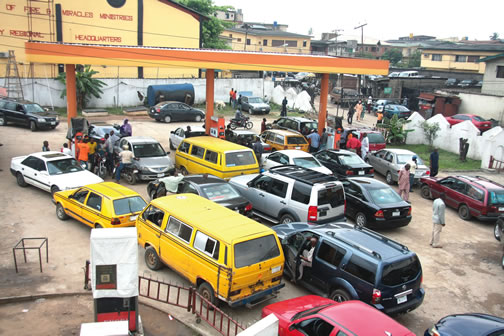Just when many Nigerians thought they were out of the woods and have kissed fuel scarcity goodbye, the ugly scenario of old with its attendant long queues of vehicles at various petrol stations across the country resurfaced. This is happening six months into the life of the President Muhammadu Buhari-led administration, which was elected on the promise of change and a new era for the citizens.
Indeed, many Nigerians have expressed disappointment that their high expectations from the new government are gradually fading away, leading to possible despair and despondency.
A member of the Organisation of Petroleum Exporting Countries (OPEC), Nigeria, with a huge crude oil production capacity of 2.5 million barrels per day, is ranked as Africa’s largest producer of oil. Sadly, the country depends largely on importation to meet local demand for petroleum products, which is estimated at about 40 million litres of Petroleum Motor Spirit (PMS) daily.
Nigeria is among the top 12 largest oil producing and exporting nations. It is the only OPEC nation that depends on imported petroleum products.
Over the past 20 years, there is hardly a year going by without Nigerians being subjected to the agony of fuel scarcity and its attendant consequences on their means of livelihood and the overall national economy. Fuel subsidy is said to be at the root of the recurring perennial fuel scarcity across the country. But the question on the lips of many Nigerians is, how could this be, with several adjustments in the pump price of petroleum products by successive governments and the recent crash in the price of crude oil.
Governments and operators have shamelessly bandied all manners of excuses and shifted the blame for the ugly situation. When it occurred about the second quarter of this year, the story by the former administration was that petroleum tanker owners refused to lift products to retail outlets because of fuel marketers’ failure to pay for their past services. Marketers in turn blamed their indebtedness to the transporters on the Federal Government’s inability to meet its fuel import subsidy obligations.
While the blame game lasted, Nigerians paid dearly and suffered untold hardships with the pump price of Premium Motor Spirit (PMS) rising to as high as N400 per litre from the official rate of N87 per litre.
About three weeks ago, the country was again plunged into a fresh round of fuel crisis, with reports indicating that PMS now sells for between N200 and N300 per litre, depending on which part of the country one is.
The Nigerian National Petroleum Corporation (NNPC) has been dishing out figures representing millions of litres of PMS trucked out to various parts of the country amidst the crisis, but the scarcity persists.
Reports last week said President Muhammadu Buhari has sought approval from the National Assembly to pay N413 billion subsidy claims put up by oil marketers, as the N140 billion appropriated for subsidy payment in the 2015 budget was not enough. Hope is thus raised that with the outstanding N413 billion paid, oil marketers would team up with the NNPC to guarantee unhindered supply of petroleum products nationwide. Similar arguments were advanced in the past though but they in no way diminished the recurrence of fuel shortages.
Worse still, nothing holds any strong promise that President Buhari’s payment of the N413 billion to marketers would arrest the vicious circle made possible by the country’s almost total reliance on the importation of petroleum products to meet local needs; which makes the stranglehold of ravenous oil marketers on the nation’s jugular possible.
Truth is, Nigeria’s fuel subsidy regime has been marred by large scale corruption and mismanagement. It has been characterised by a total lack of transparency and accountability.
For instance, in the first quarter of 2012, a parliamentary report from the House of Representatives revealed that corruption in fuel subsidy scheme drained $6.8 billion (N1.36 trillion) from the country’s coffers from 2009 to 2011. Many of the companies and individuals indicted by the investigation are yet to be prosecuted.
The significant drop in crude oil prices and the recent acute fuel scarcity present a window of opportunity for a painless reform of the fuel subsidy regime in Nigeria.
Government must act now by undertaking a complete overhaul of the subsidy regime to put an end to the sleaze bedeviling it and hardship faced by Nigerians.
